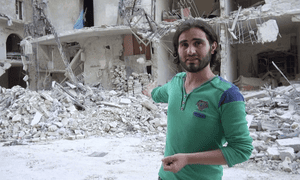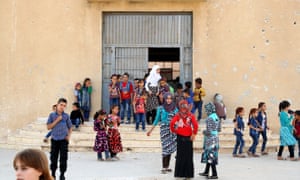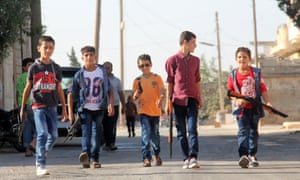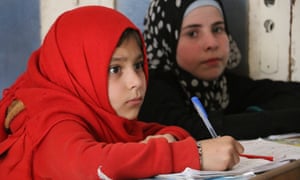
'Abdulkafi Alhamdo is an English teacher in Syria. He loves Coleridge and Shakespeare and is currently teaching his students Joseph Conrad’s Heart of Darkness. In 2016, he was evacuated from Syria’s very own heart of darkness – Aleppo – where he taught traumatised school children in cellars and bombed-out buildings throughout the siege, even as they starved. Now he lives and works in the rebel-held north-west province of Idlib, where he and fellow teachers are struggling with few resources and little support to educate the next generation, those who will shape the future of Syria.
Idlib, the largest province in Syria to remain outside the control of Bashar al-Assad’s régime, has seen a steady increase in bombing raids by Russian and Syrian jets and the arrival of refugees fleeing from other war-ravaged zones, which – according to Alhamdo – makes the ongoing work of Syria’s teachers all the more vital. “We want education to continue because we don’t want these young children or students to think of guns,” he says. “Without schools, they would carry guns but, because of their attendance at school, they are students.”
According to Anna Nolan, director of the human rights group The Syria Campaign, at least 2.5 million locals and refugees are now packed into Idlib, which has been described as “a kill box”. There is great humanitarian need and no state education, but Nolan says that remarkable efforts are afoot on the ground to preserve civil society, with teachers organising their own schools and university classes, often working voluntarily without pay to build an extraordinary patchwork of DIY education.
Some have set up their own after-school clubs offering formal lessons, creative arts and vocational training, while others forced out of buildings by armed rebel groups are teaching classes in the open air and on WhatsApp. “There’s a real determination,” says Nolan. “What we hear again and again is that they know that education is the key to the future and this is the generation that will rebuild Syria. The depth and creativity of the services being provided is incredible.”
Many of the teachers now working in Idlib are themselves displaced, among them Alhamdo, who fled Aleppo with his wife and young daughter and nothing else. In Idlib, the bombs are still falling – “There’s always bombing. This is our life,” says Alhamdo – but it’s nothing like his experience in Aleppo. “Aleppo was something unusual,” he says. “Every day when I went to school to see my students – they are like my children – I just check who is absent, who is alive and who is not, and then I start teaching them. We would stop many times because there were bombings. For one or two hours, we go to a cellar then, after the bombing stops, we go back again to our class and teach. If the bombing was heavy, we let our students go home.”
In April 2015, Saad Al-Ansari school, where Alhamdo was teaching, was hit by a rocket. He was returning from the playground when an explosion ripped through the building, killing four teachers and three students and injuring dozens more. “My heart jumped out of my body,” he recalls. “I saw the students running out, blood on their faces. They were in trauma, crying: ‘Did you see my little brother? Did you see my sister?’ They did not know what to do. Most of them were running out without shoes, without their books. I went inside and saw blood everywhere.”
From that point on, the large-scale schools were abandoned and teachers organised their classes in small, makeshift schools in local neighbourhoods, so that the children did not have so far to travel to school and – should another rocket hit – the number of potential victims would be fewer.
“When you teach in such circumstances, you are more psychologist than teacher,” says Alhamdo. “You have to be so careful about their trauma and their personal stories. When there’s heavy bombing, you tell the children they are heroes because they are still learning. It was a very, very difficult job.”
The children, traumatised by their experiences, found it hard to concentrate, but their teachers tried to preserve some normality for them. They still sat their public exams, hidden in cellars away from the shelling. “The conditions were very, very bad, but we could not let the war or their situation affect their progress. They are the future of Syria for us.”
Now in Idlib, he is teaching linguistics and the modern novel at the Free Aleppo University in the Idlib countryside to students who have fled from regime-held areas. The university opened in 2016 as one of the country’s few remaining centres of higher education. On days when shelling is intense and the danger is too great, students have lessons via WhatsApp, and some medical students have lectures online from doctors in the US. “I am proud of my students and I’m proud of teaching … My students are my heroes,” says Alhamdo.
In one recent incident, students and teachers resisted an attempted takeover of the university by the armed military faction Hay’at Tahrir al-Sham (HTS). When they refused to sign the university over, HTS threatened the university and prevented them from using the building for lectures, so Alhamdo and his colleagues took their lessons outside. “It might not be safe for me as a teacher but we cannot surrender.”
In Atmeh, a village in the north of Idlib near the Turkish border, Sawsan Abbar has opened the “Read and Rise” primary school for girls. Her husband is the headteacher. The school is attended by 120 girls, all of whom have been displaced from their home towns and cities by the war. There are few teaching resources so Abbar and her colleagues have to be creative, sourcing materials from the internet and printing them out for their students.
In the absence of so much else, the school has taken on a central nurturing role in the children’s lives. “Some of the kids call me and other teachers Mama or Auntie,” says Abbar, adding: “What keeps me awake at night is aerial bombardment. We have to skip school sometimes and it’s very worrying.”
Meanwhile, in the city of Maarat al-Nu’man, also in Idlib province, teacher Mariam Shirout has set up her own after-school provision for children in the area. In the morning she teaches in the city schools that are still functioning – they were once state schools but have been taken over by non-governmental organisations (NGOs) – and in the afternoon she opens the doors to her own school for children aged four to 15. It is called Bilelem Nartaqi, which means “with education, we advance”. It started small in 2013 but has grown and now educates between 150 and 200 children from all over the city.
Advertisement
“Education is the backbone of the area,” she says. “No matter what happens, I will be working until the last minute. When I see the children coming to the centre under the bombardment because they want to spend time with their friends and me, I can’t think about stopping anything, ever.”
Shirout and five colleagues teach reading, writing, mathematics, English and Arabic. They also provide extracurricular activities including drama and singing and vocational training such as sewing. “My school also provides psychological and social support to the children to help them deal with the traumatic experiences they are going through.
“The shelling can really affect their work,” she says. “They are trying to be ambitious and believe they can continue with their work, but sometimes they have to stop for a few days because the shelling is unbearable. They are really afraid. Sometimes the schools stop for around 10 days or a month because of the intensive shelling.”
Shirout, who is single and has no children of her own, says her pupils are becoming adults prematurely. “They just want to survive. They are always distracted, always thinking of something else. Their minds are always busy. They love school. They want to come, but they are still really distracted and that makes it hard to learn.
“I worry about my students all the time – not just about their physical safety but their mental health and their future. The education services available are not enough – it’s like a sticking plaster. If the situation continues as it is, the future of most of the students will be lost.
“My students are not children any more. We can’t ask them what they want to be in the future. The future is not clear.” '




0 Response to "The teachers of Idlib on the impossible struggle to educate their students"
Post a Comment